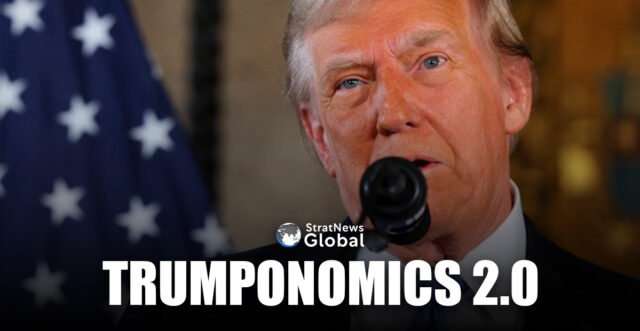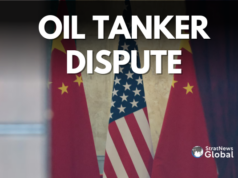Donald Trump is yet to take office, but the world of finance and banking globally is preparing to brace for another era of Trumponomics, which focuses on tax cuts, protectionism, and an aggressive stance on trade.
The world’s economic reckoning with the incoming Trump administration kicked off in earnest this week, with the U.S. Federal Reserve flagging fewer rate cuts, a resignation in Canada over budgeting for tariffs and heightened focus on cryptocurrencies.
Fed’s Preparation
The Fed cut rates as expected on Wednesday amid a busy year-end run of central bank meetings from Ottawa and Frankfurt to Tokyo and London that showed heightened uncertainty ahead of Donald Trump entering the White House in the new year.
Indeed, Fed officials not only dialed back projections for rate cuts in the face of stubborn inflation, Chair Jerome Powell said some in the bank were also trying to judge how Trump’s planned tariffs, lower taxes and immigration curbs might affect policy.
The upshot was U.S. central bankers penciled in estimates for higher growth next year than previously estimated, but also notably higher inflation.
That left Powell repeatedly urging “caution” around additional rate cuts from here, which triggered a slide in stock prices and a recalibration of market estimates for further easing. Just a single Fed rate cut is now priced in for 2025.
“Some people did take a very preliminary step and started to incorporate highly conditional estimates of economic effects of policies into their forecasts at this meeting,” Powell said when asked if Trump’s policies factored into officials’ thinking.
Stock Market
U.S. stocks plunged on Wednesday, with all three major indexes posting their biggest daily decline in months, after the Federal Reserve cut interest rates but signaled a slower pace of rate cuts to come.
“Some people said they didn’t do so, and some people didn’t say whether they did or not. So we have people making a bunch of different approaches to that but some did identify policy uncertainty as one of the reasons for their writing down more uncertainty around inflation.”
In Asia, The Bank of Japan on Thursday kept ultra-low interest rates as the threat of Trump’s policies cast a shadow over the export-reliant economy.
“Uncertainty surrounding Japan’s economy and prices remains high,” the BOJ said in a statement announcing the decision.
Global Banks
A Reuters survey of Japanese businesses published last week showed nearly three-quarters expect Trump to have a negative effect on their operating environment, something BOJ officials may have to reckon with as the world’s lone developed central bank is still trying to tighten policy.
Ahead of the Fed decision, rates had already been lowered last week by the European Central Bank and Bank of Canada, with both expected to deliver some additional easing in 2025 amid weakening outlooks.
While ECB President Christine Lagarde was vague about further rate cuts, she went out of her way to emphasize downside risks to growth, including from prospective trade tensions with the United States under Trump.
Rate decisions are still due in the coming hours from central banks in Sweden, Norway and the United Kingdom.
Trump Fear
Although Trump may have been just at the periphery of officials’ thinking at the Fed, he was a central focus in Ottawa when Canadian Finance Minister Chrystia Freeland quit after clashing with Prime Minister Justin Trudeau on how to handle possible U.S. tariffs under the next U.S. administration.
Freeland said the threat of new U.S. tariffs represented a grave danger after Trump last month warned he would issue levies on goods imported from Canada and Mexico of 25% unless the two neighbors limit the flow of migrants and fentanyl into the U.S.
“That means keeping our fiscal powder dry today, so we have the reserves we may need for a tariff war. That means eschewing costly political gimmicks, which we can ill afford,” she wrote in a letter to Trudeau posted on X.
Meanwhile, crypto market enthusiasm for Trump’s notion of establishing a strategic reserve of bitcoin was dealt a setback when Powell said the Fed had no legal authority to hold it, adding declaratively that it had no plan to seek a change in the law so that it could.
“That’s the kind of thing for Congress to consider, but we are not looking for a law change at the Fed,” Powell said.
The remark contributed to a broad slide in crypto-related assets, including a 5% drop in bitcoin itself, its largest decline in more than three months.
(With inputs from Reuters)





